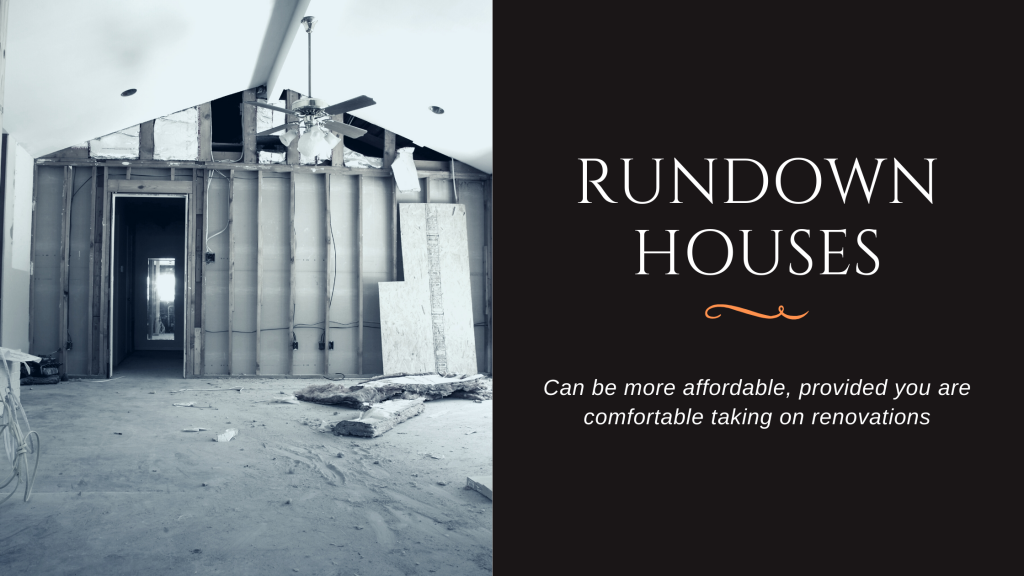So you’re looking to enter the real estate market as a fix and flip investor, but you also want to know how to find a really good property deal. Depending on where you are located, you may be faced with staggering home prices that you could purchase, but which will leave you with no funds to renovate it afterward. There is no need to panic: once you’ve read this article, you’ll have a clearer idea of how to identify undervalued real estate and how to pursue them effectively.
Finding undervalued real estate goes a long way towards making sure your financial investment is sound, and that you still have options after you’ve acquired a property. During times when real estate values are rapidly increasing, it can sometimes be challenging to find properties at good prices. This is especially true of metro areas where housing prices are significantly above the average property price found throughout the country. However, undervalued homes are still bought and sold in competitive markets – you just need to know where to look and the steps to take to make them yours.
This is how to find undervalued real estate in any market conditions:
Table of Contents
Focus On Data

If you’re looking for an undervalued property, you need to know your local market and know it well. The best way to do this is by collecting data and doing research about the best areas to purchase property in your city or state. When a property is undervalued, the cost will be lower than the as-is value which can be improved by renovation and other steps taken by the real estate investor. There are several reasons why a property may be undervalued – the homeowner may be unaware of the true value of their home, the property may need significant renovations or the homeowner may be in distress and looking to sell quickly.
The next step is to research other properties in the area you are interested in and take note of their pricing over the past three months. This will help you to make sure that you are not paying above the local value for a property when you decide to make an offer on one. You want to collect as much information as possible, including what capital growth looks like in the neighborhood, how many days houses spend on the market on average, and more. You’ll also want to pay attention to any companies launching new headquarters in the area as this can cause a boom in demand for houses and represent a good time to buy.
An expert tip is to focus your property search in neighborhoods that have good access to amenities but still have a lower median price. It’s also important to know the target demographic of buyers in that area. Families will want to live close to schools, while younger people want to live close to nightlife. You’ll want to buy a property that will be desirable to buyers of that area’s main demographic to ensure you can successfully resell it later.
You can use the free FlipScout tool to find properties that you can earn the highest return on. Search any zip code or city, find real estate and get a leg up on the competition.
Look For Motivated Sellers

The best way to find an undervalued property is by specifically looking out for motivated sellers. You can do this by finding out more about the circumstances of the sale – why is it being sold and the sellers’ circumstances. Try to gauge how motivated they are to get the property off their hands. Some real estate investors even pay attention to recent death and divorce announcements to get early tip-offs on properties that can go up for sale soon.
If the property is being handled by a realtor, try and ask pointed questions about the sale when viewing the house. Have the owners already bought a home somewhere else? Are they in financial trouble? Divorces or new job opportunities can also cause sellers to be more motivated to sell their homes and move on. These sellers are more likely to accept lower offers or to make concessions that will help out the buyer.
Developing strong relationships with others in the real estate industry can also help you get tips on homes with motivated sellers. A large portion of success in real estate can be attributed to networking. Having a network to rely on means having the opportunity to share notes, finding new deals and
For many motivated sellers, accepting a lower price now is worth more than the possibility of a better price being offered, or not offered, later. In fact, these sellers have been known to leave their property listing up to see which offers they can get prior to taking the listing off the market.
Choose The Ugly House

As the old saying goes, you want to look for the worst house on the best street. This is a well-proven method of maximizing your capital gain over the long-term. Look for the homes that need some work in order to be perfect – other buyers will often pass over these in favor of turnkey homes and that’s your opportunity to buy.
The majority of buyers are not looking for fixer-upper projects, instead wanting to buy a home that needs minimal work in order to be livable. This means that properties that have 70’s style orange and brown tiles, old-fashioned kitchens with ancient built-in appliances, or other bigger renovation tasks will stay up for grabs longer, and at lower prices. Another important aspect of real estate investing is vision; you need to be able to see diamonds in the rough.
On the flip side, you want to be careful not to choose a property that will cost you more than it’s worth. If the cost of renovation ends up being higher than the original acquisition cost, then you may have a problem on your hands. Many less experienced real estate investors end up overspending on renovations, and particularly on renovations that do not add value back to the property.
When buying a fixer-upper, be sure to factor in the cost of repairs, renovation, and holding costs that will come with owning it. The last thing you want to do is end up with a money pit that you cannot resell
Go To Auctions

Another good source of undervalued homes is property auctions. At property auctions, you have the opportunity to negotiate for a real bargain. This method of property acquisition can be riskier than the other options listed in this article, but also holds a lot of potential to find great deals. These auctions can commonly be found through local governments, banks, real estate agents, or listing sites like Auction.com to name one option.
For example, if a property is quoted at auction as being $650,000, but is only really worth $600,000, there will be fewer buyers competing for it. Once a home like the above has struggled to sell, it becomes much easier to go in and negotiate a lower price like $580,000 at the final auction.
The biggest benefit of finding a house through this method is that lengthy negotiation periods are eliminated. If your bid is the winning one, the home is yours and it’s as simple as that. As the highest bidder, you may have to cover a percentage of the housing cost on the spot as closing can happen in less than a month. This method is another time when prior research will prove important – you should have a good idea of what local property prices are on average before bidding to make sure you are getting a good deal out of it.
Another big benefit of home auctions is that these purchases usually come with significantly lower interest rates and cash-only sales. Cash sales can be a double-edged sword for buyers. As a cash buyer attending a property auction, you should have at least 10% of your winning bid on hand to lay down as an immediate deposit.
On the other hand, auctions of this nature can come with some risks and challenges that you will need to bear in mind if you’re considering this option. For one, many of these auctions sell homes as-is, without the chance to inspect the property thoroughly beforehand. Another disadvantage of this approach is that it can be quite daunting if you have never attended an auction of this nature before. It can be a nerve-wracking experience and if your bids are not accepted you may feel discouraged from trying again.
Final Thoughts
If you’re looking to buy an investment home that is undervalued, you need to remember that you make your money when you buy. Undervalued homes can represent great investment deals for investors who know where to find them. By doing careful research, you become an informed buyer which has more power than buyers entering the market blindly. Your research should cover all the areas of the local housing market, including real estate prices, types of homeowners, noteworthy amenities, and other factors that can have an impact on the success of your purchase.
Part of your research should be to look for motivated sellers, who are more likely to sell properties for less. You should also be willing to buy the ugly house or the one that other buyers have passed on, as long as you are confident in your ability to renovate and resell it for a profit. The other strategy is to start attending property auctions to look for undervalued homes, but this approach can be more daunting than the others listed in this article.
In short, you don’t have to settle for paying full market price for a property. Even in real estate markets where housing markets have extremely high prices, there will always be opportunities to purchase properties that are undervalued. It’s all about knowing where to find them, doing your homework thoroughly, and then being brave enough to go out and acquire one.
No matter where you source property leads from, having an established network of other real estate professionals can help you get access to undervalued homes earlier. As part of that network, you should make sure that you have a lender in your corner that can provide you with fast funding and instant proof of funds.

